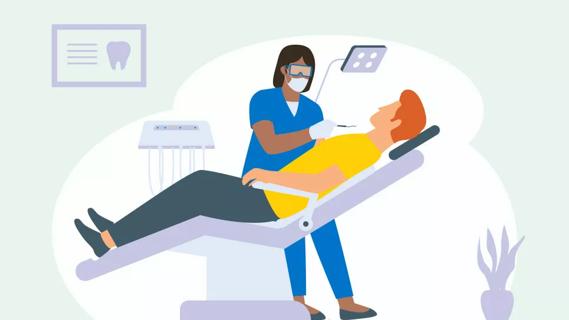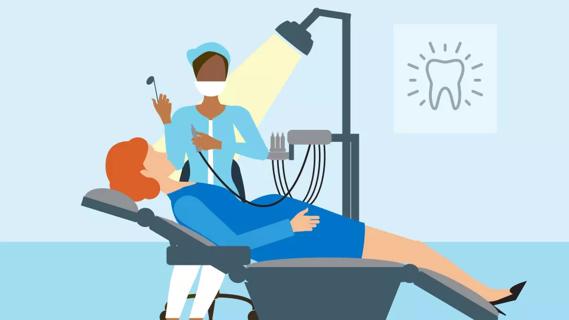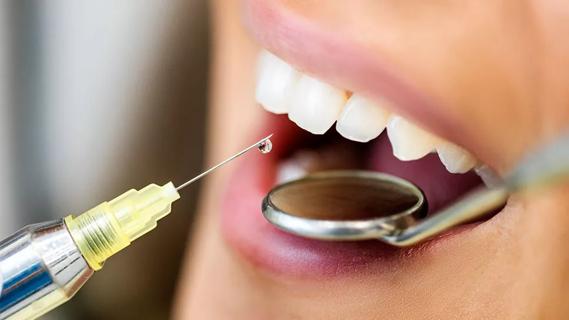You might think it’s fine, but your teeth and jaw beg to differ

Chewing gum is harmless, right? In fact, you may have even heard somewhere that it’s actually good for your teeth.
Cleveland Clinic is a non-profit academic medical center. Advertising on our site helps support our mission. We do not endorse non-Cleveland Clinic products or services. Policy
But dentist Karyn Kahn, DDS, urges you to think twice before unwrapping that next stick of gum. As it turns out, gum could pose serious risks to your jaw and teeth.
The movement of your jaw occurs at your temporomandibular joints, which are located in front of each ear. A network of muscles supports that joint. The muscles bring your jaw together so you can chew and move your jaw from side to side.
Usually, you chew to break food into smaller pieces that you can swallow. With gum chewing, though, you’re chewing just to … chew. Dentists consider gum chewing to be parafunctional, or outside of normal function.
“Parafunctional habits, like gum chewing, can cause temporomandibular disorders or make existing conditions worse,” says Dr. Kahn.
Constant gum chewing puts excessive force on your temporomandibular joints, muscles and teeth, which leads to overstress, imbalance and misalignment. This can cause:
“For some people, even a small shift in their temporomandibular joint can cause severe pain when they move their jaw,” Dr. Kahn says.
Anyone with a temporomandibular disorder (sometimes just called TMJ) should avoid gum entirely, Dr. Kahn says. For everyone else, she recommends limiting gum chewing to fewer than 15 minutes per day in order to avoid causing problems.
Gum sales started in the U.S. in the mid-1800s and soon became widespread. By the 1920s, Americans were chewing an average of 105 sticks of gum per year.
Early on, manufacturers figured out that adding flavorings and sugar to gum increased its appeal. But by the 1950s, dentists realized that the added sugar caused tooth decay.
Tooth decay occurs because the bacteria in your mouth break down sugar into acid. The acid eats away at the hard enamel surface of your teeth, a process that creates holes in the enamel and pathways for bacteria to infect your tooth’s dentin layer and pulpal tissues. Eventually, as your tooth decays, it may require a root canal to save it.
To promote better oral health, the first sugar-free gums came on the market in the 1960s.
Sugar-free gum contains artificial sweeteners such as aspartame, stevia, xylitol and sorbitol that don’t contribute to tooth decay. In fact, research suggests that chewing sugar-free gum may have some benefits.
For example, gum chewing triggers the production of saliva, which improves oral health by clearing out lingering bits of food and neutralizing the acids produced by the bacteria in your mouth.
But Dr. Kahn warns against chewing gum as a replacement for regular brushing after meals or for other oral health habits. “The best way to keep your teeth healthy is to brush after each meal and floss daily,” she says.
Dry mouth, or xerostomia, is a common condition that happens when your mouth doesn’t produce enough saliva. It can cause bad breath and, eventually, tooth decay.
“Gum does increase saliva production, but frequent gum chewing is probably not the best way to treat dry mouth,” Dr. Kahn notes. Frequent sips of water can be equally effective. And there are medications you can take to increase your natural saliva production.
Your healthcare provider can help you find the underlying cause of your dry mouth and either prevent it or develop a plan to reduce your symptoms.
Many people swear by gum to help them feel calmer, focus during a test or resist a tempting snack. But the scientific evidence is mixed. There’s no concrete proof that gum has any significant effect on your mental health, grades or weight.
If you feel that chewing gum helps you in some aspect of your life, Dr. Kahn suggests that you consider weighing those benefits against the potential negative side effects of gum chewing. Look into other ways to relieve stress and improve focus.
Quitting smoking is one of the most important things you can do to improve your health. The Centers for Disease Control and Prevention (CDC) estimates that in 2020, about 12% of U.S. adults still smoked. Many people who smoke try to quit but aren’t successful.
Nicotine gum is one strategy people use to help quit smoking. It’s not a gum you chew continuously. You chew a little to release nicotine, then tuck it between your cheek and gum, repeating this process for about 30 minutes. Some of the oral side effects include:
Though nicotine gum is intended for temporary use, Dr. Kahn advises caution, suggesting that you combine or substitute nicotine gum with other smoking cessation strategies like coaching, nicotine patches, non-nicotine medications and so on.
Contrary to what the old joke says, most people can walk and chew gum at the same time. But that doesn’t mean you should. Chewing gum can cause serious problems with your jaw and teeth.
Dr. Kahn shares these important tips to reduce your risk of gum-related problems.
Learn more about our editorial process.

If you have naturally red hair, feeling the pain may be in your DNA

Help and encourage them to brush and floss regularly, limit sugary foods and get routine dental checkups

Estrogen and progesterone changes throughout the month — and throughout your life — can make you more prone to dental health concerns

Benefits typically include bi-annual screenings and lower payments on procedures like fillings and crowns

Dental care is not only safe during pregnancy, but it’s also highly recommended

The numbness and tingling should wear off in about two hours

From posture to massage, these 9 at-home remedies may help ease your jaw pain

Once you see that first tooth, it’s time to start brushing

Your metabolism may torch 1,300 to 2,000 calories daily with no activity

A gentle touch in all the right places may help drain your sinuses